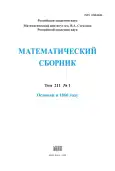Volume 211, Nº 1 (2020)
- Ano: 2020
- Artigos: 4
- URL: https://journal-vniispk.ru/0368-8666/issue/view/7461
Billiards bounded by arcs of confocal quadrics on the Minkowski plane
Resumo
Billiards are considered in compact domains on a Minkowski plane whose boundary consists of arcs of confocal quadrics with angles at corner points $\le\pi/2$. A classification is obtained for these billiards, called simple billiards. The first integrals and trajectories of the motion of a ball in simple billiards are described. The Fomenko-Zieschang invariants are calculated for every simple billiard, and a theorem is proved which shows that only three different Liouville foliations of simple billiards exist on the Minkowski plane. Bibliography: 23 titles.
Matematicheskii Sbornik. 2020;211(1):3-31
 3-31
3-31


First integrals and asymptotic trajectories
Resumo
We discuss the relationship between the singular points of an autonomous system of differential equations and the critical points of its first integrals. Applying the well-known Splitting Lemma, we introduce local coordinates in which the first integral takes a “canonical” form. These coordinates make it possible to introduce a quasihomogeneous structure in some neighbourhood of any singular point and so to prove general theorems on the existence of asymptotic trajectories which go into or out of that singular point. We consider quasihomogeneous truncations of the original system of differential equations and show that if the singular point is isolated, the quasihomogeneous system is Hamiltonian. For a general mechanical system with two degrees of freedom, we prove a theorem on the instability of an equilibrium when it is neither a local minimum nor a local maximum of the potential energy.Bibliography: 21 titles.
Matematicheskii Sbornik. 2020;211(1):32-59
 32-59
32-59


The distribution of singular points of the sum of a series of exponential monomials on the boundary of its domain of convergence
Resumo
The problem of the distribution of the singular points of the sum of a series of exponential monomials on the boundary of the domain of convergence of the series is considered. Sufficient conditions are found for a singular point to exist on a prescribed arc on the boundary; these are stated in purely geometric terms. The singular point exists due to simple relations between the maximum density of the exponents of the series in an angle and the length of the arc on the boundary of the domain of convergence that corresponds to this angle. Necessary conditions for a singular point to exist on a prescribed arc on the boundary are also obtained. They are stated in terms of the minimum density of the exponents in an angle and the length of the arc. On this basis, for sequences with density, criteria are established for the existence of a singular point on a prescribed arc on the boundary of the domain of convergence. Bibliography: 27 titles.
Matematicheskii Sbornik. 2020;211(1):60-124
 60-124
60-124


Harmonic analysis on the rank-$2$ value group of a two-dimensional local field
Resumo
In this work we construct a harmonic analysis on free Abelian groups of rank $2$, namely: we construct and investigate spaces of functions and distributions, Fourier transforms and actions of discrete and extended discrete Heisenberg groups. In the case of the rank-$2$ value group of a two-dimensional local field with finite last residue field we connect this harmonic analysis with harmonic analysis on the two-dimensional local field, where the latter harmonic analysis was constructed in earlier works by the authors. Bibliography: 15 titles.
Matematicheskii Sbornik. 2020;211(1):125-174
 125-174
125-174










